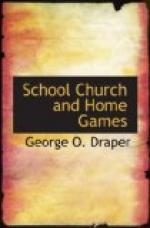Clapping Song
A pupil is selected by the teacher to clap the rhythm of some familiar air. The rest of the children in the room endeavor to guess the song clapped. The pupil succeeding in doing this is given an opportunity to clap another song.
Indian Trail
A pupil is blindfolded and placed in the front of the room. Other pupils, one or two at a time, are given the opportunity to stealthily approach the one blindfolded, in an endeavor to take some object, from before his feet, such as a flower pot and saucer, or a tin can with a loose pebble in it, without being detected by the one blindfolded. If a pupil succeeds in taking back the object to his seat without having been heard, he wins a point for his aisle. Where two pupils are sent forward at the same time, two similar objects must be placed at the foot of the one blindfolded. The aisle scoring the largest number of points in this way wins the game.
Number Relay
The pupils of each aisle constitute a team. They are numbered, beginning with the one in the first seat. The teacher describes some mathematical problem she desires done and calls certain numbers. All the pupils having those numbers rush to the board and compute the problem. The first back to his seat wins a point for his team, the aisle gaining the largest number of points wins the game.
Multiplication Race
The pupils of each aisle constitute a team. The teacher decides on a multiplication table which is to be placed upon the board. A piece of chalk is handed to the first pupil in each aisle. At the signal to go Number 1 goes to the board and writes the first example in the multiplication table thereupon. Returning to his seat, he hands the chalk to the one next behind him, who puts the next step in the multiplication table on the board, and so the race continues until the one in the last seat has returned to his seat, after adding his part to the table. The one first back to his seat wins for his aisle.
History Race
Similar to the preceding, with the exception that the pupils are requested to write upon the board the name of some historical personage or some historical event, date, etc.
Poem Race
The pupils having learned some poem may use it in a game in the following way:
The pupils of each aisle constitute a team. At the signal to go the last pupil in each aisle stands up and recites the first line of the poem, returns to his seat and taps the one next in front of him, who stands up and repeats the second line of the poem, sits down and taps off the third pupil, who repeats the third line, and so the game continues. If the poem has not been completed after the one in the front seat has said his line, he taps the one next behind him, and that one is supposed to give the next line and so on back. The aisle first completing a poem wins the race.




